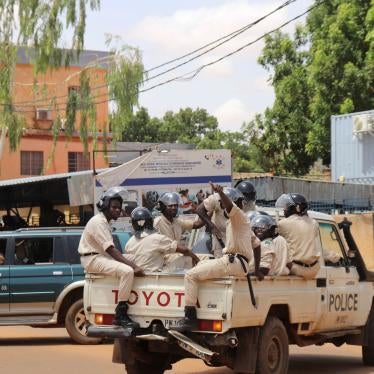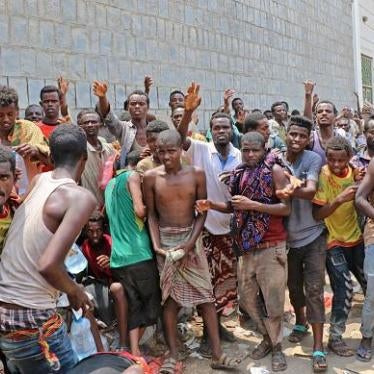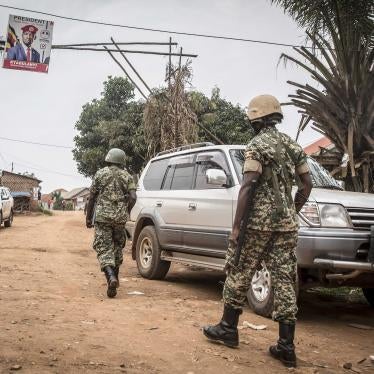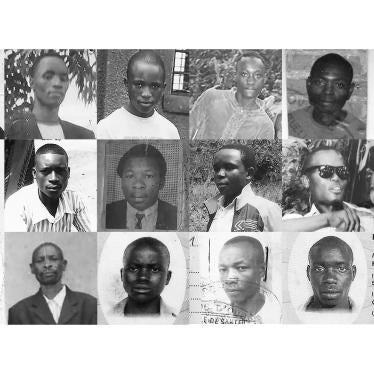In a letter to the government of Sudan, Human Rights Watch condemns recent trials of both secular and religious government opponents, who have been punished for exercising their rights to free expression and free association.
A copy of the letter is attached.
February 10, 1998
His Excellency Lt. Gen. Omar Hassan al Bashir
President of the Republic of Sudan
Khartoum, Sudan
Fax 249-11-771-724
Your Excellency:
We write to you to express concern about recent developments in Sudan, and to seek your government's comments on the situation.
We understand that there have been a number of arrests of advocates who have engaged in criticism of the government. They include attorneys arrested in late December and early January after a protest at the court house in Khartoum on December 20, 1997. Many of these advocates are said to be held in incommunicado detention, without trial. We consider that detention of such persons without charges for this length of time is prolonged arbitrary detention, in violation of international human rights standards. To the best of our knowledge, these advocates include (but are not limited to) Yahya El Hussain, Kamal Abdulrachman, Nasir al Din al Said, Ali Adam, and Al Rashid Ali Omer (of Kosti). We request that they be charged immediately and given a fair hearing (not in a public order court), or released.
We object to any trials of government opponents in public order courts, which by their nature violate the right to a fair trial. There is a marked increase in the use of these very summary courts to punish government opponents who seek to exercise their free expression and free association rights. Use of the public order courts to impose long jail terms, flog and fine persons exercising their rights makes a travesty of justice, even if the convictions are ultimately overturned on appeal. We urge your government to cease using public order courts to try such cases.
We understand that Ghazi Suleiman, who was arrested on January 20, 1998, was subjected to two weeks in detention after a summary trial in a public order court, and is now free, having had his conviction and five-month sentence overturned by the appellate court. It appears to us that he was being punished for his exercise of his rights to free expression and free association, and for his activities as a defense advocate for unpopular defendants. He headed the opposition slate in the December 1997 bar association elections, and charged that the government engaged in fraud in those elections, among other things.
We therefore request that Ghazi Suleiman be compensated for the time he has spent in jail, and that fees and expenses he incurred as a result of the trial and sentence be reimbursed to him. We further request that your government investigate the public order court judge who tried him and, if appropriate, remove him from the bench. We make the same requests with regard to all public order court defendants and trials we have mentioned in our letters to your government in 1997 and 1998.
We have received reports that Samira Karrar and Nafisa El Milaik, relatives of some of the twenty-eight officers summarily executed in 1990, were detained in late January 1998 en route to a meeting of these families, accused of possessing antigovernment material and disturbing public order, and tried by a public order court. This group of families yearly commemorates the officers' deaths by petitioning the government for return of the bodies, among other things. We consider these arrests to be a continuation of the persecution the families have suffered for asserting their human rights.
We have received reports that Sheikh Abdel Mahmoud Abbo Ibrahiem, secretary general of the Ansar Organizational Affairs, was detained by Sudan Security after giving a sermon in the Al Ansar Mosque in Omdurman at the end of Ramadan in late January. His sermon was critical of the government and it appears that his detention and trial were in retaliation for his exercise of his rights. He is said to have been tried at night without an advocate and without the knowledge of any colleague or family member, in an unfurnished home in the Abu Seid district north of Omdurman, presumably by a public order judge. Sheikh Abdel Mahmoud Abbo is said to be serving a five month sentence and to have been fined 500,000 Sudanese pounds. His case is on appeal; indeed, his appellate advocate is Ghazi Suleiman. We urge that the conviction be voided and the defendant be appropriately compensated.
After Sheikh Abdel Mahmoud Abbo's detention, his colleague Mohamed El Mahdi Hassan gave the same sermon in the same mosque and was arrested by Sudan Security. It is unclear if he has been tried or is in Sudan Security detention; he was held in a "ghost house" and mistreated a few years ago, so his exact whereabouts and treatment are of great concern.
We understand that on December 31, 1997, your government confiscated the Catholic Club, formerly used by that church as a study and recreation center, and that Sudan Security forces occupied the premises in early February. We are concerned about this development and we would like to know the reasons for this treatment of a religious institution.
We are gratified to learn that your government is now permitting the International Committee for the Red Cross (ICRC) to recommence its programs in Sudan, most of which were suspended in late 1996 after Cmdr. Kerubino Kuanyin Bol, then an ally of your government, held ICRC staff, patients and plane hostage. We hope that the ICRC can now begin its work of visiting in your detention centers and prisons captured combatants and others held in connection with the conflict.
We are particularly concerned about the fate of five Umma Party combatants captured on December 8, 1997, near Kassala, Bass Mustafa, Abdulhadi Ahmed Eikhidir, Alkhair Alsadig Hassan Musa Alsegaler, and Omar Ali Mohamed. We hope that by now the ICRC has been able to visit them. We reiterate our concern about the threatened use of the cruel and inhuman penalty of cross amputation in this case, and we would like to know the status of their case.
We earlier expressed our concern about the trial that started in November 1997 of fifteen defendants (two in absentia) on conspiracy and other charges that carry the death penalty. We have learned that the court finally secured the transfer to Kober Prison of the thirteen defendants from Sudan Security custody, where they had spent the first weeks of trial, unable to communicate with their advocates. We are gratified to see that this situation of incommunicado detention during trial was finally corrected. We would be interested in learning from your government if those in Sudan Security who are responsible for holding the defendants in Security custody after the commencement of the trial, and for several weeks after the court's order to transfer them out of Security custody, were investigated, disciplined or punished in any way. We feel that it is extremely important to hold all Sudan Security officials to the rule of law, and punish those who violate the rules of their public office.
We reiterate our firm opposition to several aspects of that trial: trial in absentia, use of testimony secured after torture, and the death penalty. As to trial in absentia, we regard that as a denial of every standard of fair trial. Where defendants have not been detained, the proper procedure would be to hold their trial in abeyance until they are brought into custody. We believe that testimony secured after torture should not be used in evidence, in order to deter security agents from further torture and to assure that justice is done.
As to the death penalty, we note that your government is not obliged to seek the death penalty but instead may ask for a lesser penalty. We urge that prosecutorial discretion be exercised in this case and all others.
We are quite concerned about press reports that, since your government came to power in 1989, some 100 persons have been sentenced to death and executed. Even taking into account the fact that more than one-fourth of this number (twenty-eight army officers) were executed in 1990 as the result of a coup attempt, that number is still much higher than we had been led to believe in interviews with government officials. The most urgent case is now the case of Abd al HalimAbd al Raziq, a member of a religious sect which believes that all others are infidels. He was convicted of murder following his participation in an attack on an Ansar al Sunna mosque in Wad Medani in September 1997 in which two people were killed. Appeals have run out and he faces imminent execution. We ask that he not be executed.
With regard to the war, we note that there has been heavy fighting in and around Wau. We are concerned that your government, according to the United Nations, has not permitted free access to civilians displaced by the fighting; they are said to number between 100,000 and 150,000, and are in immediate need of food and other assistance. We urge you to grant immediate access to the United Nations and its partners for humanitarian relief purposes.
Recalling the events of Juba in June and July 1992, we also urge your government to use caution when dealing with those suspected of involvement with rebel forces in and around Wau, and to instruct all military and security forces to refrain from retaliation against suspects. In particular, if arrests are to be made, care should be exercised to assure that all detainees (whether civilian or military) are registered immediately and that their families and their religious, relief and other organizations be given immediate access to them.
Thank you for your attention to these matters. We look forward to your government's response.
Sincerely,
/s/
Jemera Rone
Counsel








